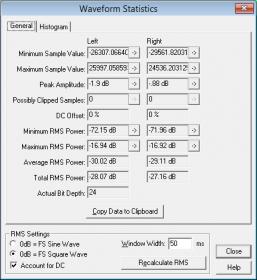Yes, Tim, that's my point - you & Max argued about using a couple of controls(blind & level matched) as the controls needed & challenged me to name other biases/factors that affected the test without having read the standards document that nominates the factors needing to be controlled. You argued with me that stress was not a factor. You basically never admitted to any other controls necessary & this is because you never read BS1116 or were aware f it's existence. JJs list you may or may not have been aware of - I don't believe you knew of it or who he was but this list was ignored too. So, up to recently you have not bothered to read the landmark documents in the field. Max even refused to read it & questioned the document & you yourself did too - stating it was only a recommendation, etc.Well, Tim, the first step is knowing what the accepted standard set of controls are for reliable tests - something that was not demonstrated on this thread & is not typically known among the audiophiles who run blind tests. So their ignorance often results in an arrogance about the veracity of their results.
Never heard of them before. But Ive never run a blind listening test for the purpose of proving anything to any one but myself, so I've never needed to look into telecommunications ABX testing methodologies.
Now, Tim, I'm afraid I hold no credence to your position or arguments, as a result
You can't seem to understand that I'm not saying it's all or nothing but I am saying that you need to know what remaining biases are of importance in order that you can ignore their influence. But you seem not to want to deal with this logic. For instance, how much is stress (a new factor introduced by the test itself) influencing the results? Really, Tim, it's a simple & necessary question of logicNo need. I think we're about done here.
Or maybe not. You still seem to be trying to invalidate anything that doesn't include everything. Even though there is no agreement on what constitutes everything. You're having a lot of trouble letting this one go, john.
yes, you have in the past - if you now want to retract that fine?I've never defined a stopping point, John, or identified a small number of controls. Nor have I said blind tests are all about bias removal. I don't think anyone has said that, actually. The blind part is, of course, about avoiding bias, but it indeed takes more than lack of knowledge to make a test.
It might be considered a hard line but it's logical & it forces you & others into considering the logic behind the factors involved in producing valid tests. I also gave the short cut to possibly avoiding all these controls which was to include positive & negative controls/anchors within the test. You see, it's all tied together, Tim. So yes, without due consideration & some reasonable attempt to control influencing factors in a blind test then it is the same as an anecdotal sighted listening report.Perhaps you did, but that's not what you and I have been debating. What we've been debating is so simple, and I've,stated it so many times at this point that it's amazing that you're still arguing sidebars. You stated, unapologetically, unambiguously...somewhere in the mid hundreds by post count here...that without all the controls, and I believe at that time you were referring to JJ's summary of BS1116, an unsighted test was no better than no controls. You seemed to have backed off of that hard line of unreasoning, thankfully...or maybe not.
Except I can evaluate sighted listening reports better as there are usually more data points involved, especially when people report specific differences they have heard with specific tracks. I can usually ask further questions of those providing sighted listening reports & get reasonable answers. The binary yes/no style of blind tests usually means that there is nothing more to know about the test.
Product development, marketing, pharma, and many other fields make extensive use controls in blind studies. I'm sure Olive and Toole used controls in their studies at Canada's national research center and at Harman. Are you talking about hobbyists self-testing and reporting back on Internet forums? We can agree that those "tests," including the ones that started this thread, are interesting, but anecdotal.
Tim
Tim, I'm not talking about professionally run tests that stretch over a number of weeks, as you well know!
Last edited:

















